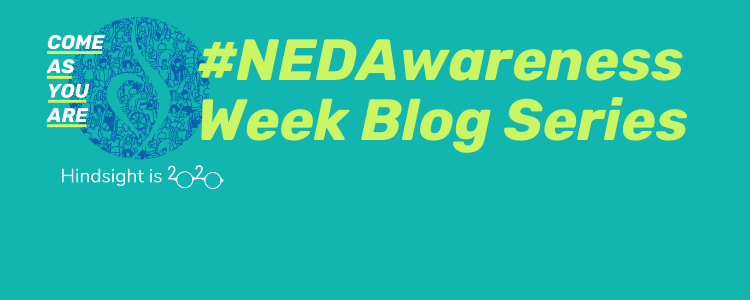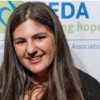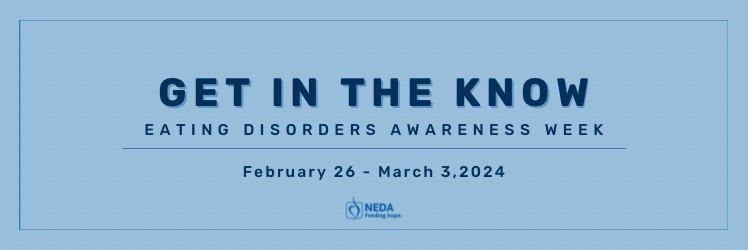On behalf of the National Eating Disorders Association (NEDA), I want to thank everyone for a meaningful and empowering National Eating Disorders Awareness (NEDAwareness) Week 2020.
At the beginning of the week, we posted a question on Instagram Stories asking, “What advice would you give yourself and others this NEDAwareness Week?” As those responses were coming in, I had the honor of kicking off NEDAwareness Week with a few pieces of advice from the NEDA team:
1. No Before and After Photos
While we love hearing about everyone’s journey and encourage you to Come as You Are, please refrain from sharing before and after photos. Side-by-side comparisons are not only triggering, they perpetuate the stigma that eating disorders have a certain look—which they don’t!
2. Stay Away from Sharing Numbers
When sharing your story, please try to stay away from using numbers (e.g., calories and weight). This can unintentionally serve as a how-to guide and bring about comparison which is not healthy or helpful.
3. Practice Self Care
While NEDAwareness Week is intended to be empowering and help spread awareness, it can also be overwhelming, especially if you have personal experience. Be sure to step away from social media if you feel overwhelmed by all of the information and posts.
4. Be Kind
Everyone’s story is different and valid. If NEDA feels that comments on our posts are harmful, we may delete them at our discretion.
As the week unfolded, we noticed many folks sharing these values and taking our tips seriously. While we can’t censor or prevent everyone from posting triggering photos, numbers, and comments, we felt there was less harmful content than previous years and we applaud our community members for sharing their stories responsibly.
In the spirit of this year’s theme, Come as You Are: Hindsight is 20/20, I wanted to end this week with advice you all submitted, while reflecting and expanding on some of these thoughts.
Here are 16 tips from the NEDA community to add to the four above:
5. “Eating disorders don’t have a look or size,” and “Never believe your body size determines your health or disorder.”
NEDA prioritizes inclusivity and diversity in our messaging, and we will continue to share these types of statements until everyone understands that eating disorders don’t discriminate. As a reminder, anyone in any sized body can have any eating disorder. Likewise, you cannot determine a person’s health just by looking at them, and this stigma can prevent people from getting the help they need and deserve.
6. “Lean in and learn something new.”
NEDAwareness Week is about busting myths and changing the conversation around food, body image, and exercise issues. From the Facebook Live panels – Where is the Field? and Where is the World? – to our NEDAwareness Blog Series, there is plenty of new information to be learned, and we know there are more stories to be told by those in our community.
7. “Surround yourself with people who love you and want the best for you.”
This is great life advice. Period.
8. “The best way to take care of others is to take care of yourself first.”
NEDAwareness Week is a wonderful opportunity to shine the spotlight on eating disorders; however, it can also bring about different emotions and triggers. Personally, I put in a lot of physical and emotional labor this week, and I made it a priority to carve out time each day for self-care so I can recharge and continue supporting others. We all know the “put your oxygen mask on first, before helping others” line, and NEDAwareness Week is no exception!
9. “You can’t advocate for yourself and for others in hiding. It’s time to step out of the shadows.”
More than 400 people signed up for NEDA’s first in-district advocacy day! We are so grateful to all of the advocates who spoke with federal lawmakers and their staff to help build support for eating disorders research funding and prevention initiatives! Didn’t get a chance to advocate in person? No problem! You can click here to send an email to your lawmaker asking for support.
10. “Know that your voice is worthy of being heard.”
In addition to all of our in-person NEDAwareness advocates, each and every one of you can make a difference by sharing your story with NEDA, on social media, and with your loved ones. Your story matters and your voice is worthy of being heard!
11. “Check in on your friends,” and “Tell those you are close to who have dealt with an eating disorder that you’re proud of them.”
NEDAwareness Week wouldn’t be what it is without the support from our allies. If your loved one is currently struggling or in recovery, I encourage you to take a few moments to check-in and let them know you’re thinking of them.
12. “Stay open-minded regarding the struggles of others,” and “Try not to compare your story with someone else’s.”
Just because your experience might look or sound different than someone else’s, that doesn’t mean anyone’s struggle is more/less valid. This was one of the hardest—and most validating—things I learned throughout my own journey.
14. “It’s okay to talk about your trauma.”
Thank you to whoever shared this advice. Trauma is real and can have serious implications. I know it can be difficult to revisit the trauma, and you may fear (and/or experience) judgement and disbelief; however, your trauma is an important part of your story should you choose to share it.
15. “It’s okay if you’re not ready to share your story yet.”
Whether it’s talking about your trauma or your experience with food, body image, and exercise issues, you have every right to keep that private or only talk about it with loved ones. Just know that if/when you are ready to share your story, the NEDA community will be here to support you.
16. “Go easy on yourself.”
NEDAwareness Week may bring up different emotions for different people. For some it’s a reminder of how far they have come, while others might hone in on the challenges and setbacks. No matter where you are in your journey, you are enough, you have enough, and you do enough.
17. “Remember how far you have come and how much strength you have.”
Recovery does not happen overnight. Each day you recommit to your recovery, you are making progress and proving your strength to yourself. You can do it!
18. “It’s okay to be honest, it’s okay to say that you need help, and it’s okay to ask for it.”
It takes a lot of courage to let others know you need help of any kind, let alone help with your eating disorder. While it can be difficult to tell somebody what you’re going through, seeking help from a professional and having a support system are beneficial and recommended.
19. “You are not alone.”
Based on the support and encouragement we’ve seen during NEDAwareness Week, we can confidently say there is a community of wonderful people who understand you and your story. We will always be here to offer up encouragement when you need it and remind you that you are not—and never will be—alone.
20. “Recovery isn’t a straight path, but it’s possible!”
Let’s end this list—and NEDAwareness Week—with a message of hope. There are many different paths and journeys to eating disorder recovery, and the important thing to remember is that recovery is possible with the right help and support.
For recovery resources and treatment options, please visit our help and support page. If you or someone you know is struggling with an eating disorder, call ANAD’s Helpline at: (888) 375-7767 or the National Alliance of Eating Disorders Helpline at: (866) 662-1235.
If you are thinking about suicide, call or text the National Suicide Prevention Lifeline at 988. In crisis situations, text “NEDA” to 741741 to be connected with a trained volunteer from the Crisis Text Line.
Chelsea Kronengold is the Communications Manager at the National Eating Disorders Association (NEDA), overseeing NEDA’s social media and communications. Additionally, Chelsea serves as a master trainer for the Body Project; an evidence-based body confidence and eating disorders prevention program for women and girls. Chelsea frequently speaks on behalf of NEDA about her personal and professional experience with body image, eating disorders, media literacy, and weight stigma; she has appeared in national media platforms including Teen Vogue, Huffington Post Live, Seventeen Magazine, WebMD and SiriusXM Doctor Radio.






